Canned food is often full of artificial flavourings, too much sugar or salt – no surprise here, how else are they meant to make something sit on a shelf for years and still taste good?! But even if you do find a brand that is healthier (organic, low sodium…) it turns out you may still may have BPA to worry about! They’re not making it easy on us are they! Let’s take a look at what’s happening:

BPA is all about the plastics right, so what’s it doing in cans too? It’s actually found in the plastic lining inside cans, which is used to help extend the shelf life and prevent corrosion. If you hadn’t noticed it before, next time you open a can, take a look inside.
BPA is used to make plastic, and was originally developed in the 1960‘s, but it wasn’t until 2011 that the American Medical Association labeled it as an “endocrine disruptor” Though the FDA has deemed it safe in small amounts, researchers are now concerned about the potential effects of BPA on the brain, behaviour, and prostate gland in children, both before and after birth. It’s been shown to raise risk for cancer and other diseases found in animal studies. A recent study from Harvard showed that people who ate one daily serving of canned food over a span of five days, had a ten-fold increase of BPA in their system. And worse yet, if you eat an entire meal from a can, say a soup, levels spike up to… 1000 percent!
In general, most studies have found that urinary BPA levels in typical adults average somewhere around 2 micrograms per liter. After eating canned soup, though, their levels rose above 20 micrograms per liter, a 1,221 percent increase.

So, as always, the best option is whole foods: whole tomatoes instead of canned tomatoes… but let’s not lose perspective. The goal is to reduce our exposure to chemicals, and, if the occasional can of tomatoes helps you get dinner on the table – you’ll likely be healthier for having eaten the tomatoes than not.
I think the point is to not rely on canned foods. Even though it’s not always easy to remember to soak our beans the night before, or take an afternoon to cook a pasta sauce – if its important to you to eat well and be healthy, then make it a priority. We can always choose to enjoy the experience of slow-cooking… I like pretending that I’m on a cooking show, unless that’s embarrassing, then… it’s totally not what I do.
P.S. in case you’re wondering, “what the heck can I eat?!”, check out this website. They emailed several food manufacturers to ask them directly if their products have BPA and list out the brands that are BPA-free!

3 responses to “Where else is BPA lurking?”
Thanks for sharing about BPA and the website! It’s great, but it’s a pity that it’s not longer updated. Now I’m concern about BPA in canned pet food.
Safe Receipt Paper!
BPA is also found in high doses on all thermal paper reciepts, some companies sell BPA Free paper rolls, but the BPA has been replaces by another Bisphenol compound , most likely BPS which defeats the purpose of the exercise, ie: Safer Till Rolls.
BPS is also another compound of Bishenol which is suspected to be doing the damage to the body.
Insist on Bishenol Free Receipt Paper from your supplier.
We at BPAFreeRolls.com sell only thermal paper rolls that are BPA Free – BPS Free – Bisphenol Free – Phenol Free – Phthalates Free – Safe TillRolls
bpa is also found lining the lids of most grocery store jars (including mason). reusing such things is not a good thing if you are prone to bounce the contents of said jars around (as in using one to shake up a vinaigrette). your “jam jars in the fridge” idea might be affected.